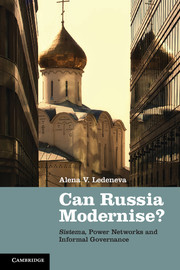Crossref Citations
This Book has been
cited by the following publications. This list is generated based on data provided by Crossref.
Onoshchenko, Olga
and
Williams, Colin C.
2013.
Paying for Favours: Evaluating the Role ofBlatin Post-Soviet Ukraine.
Debatte: Journal of Contemporary Central and Eastern Europe,
Vol. 21,
Issue. 2-3,
p.
259.
Kastouéva-Jean, Tatiana
2013.
Les jeunes : vers l'explosion ?.
p.
142.
Fedirko, Taras
2013.
“I'd Rather Pay”: Bribery and Informal Practices in Ukrainian Bureaucracy.
Student Anthropologist,
Vol. 3,
Issue. 2,
p.
61.
Kleiner, V.
2014.
Corruption in Russia, Russia Corrupted: Is There a Way out?.
Voprosy Ekonomiki,
p.
81.
Shekshnia, Stanislav
Ledeneva, Alena
and
Denisova-Schmidt, Elena
2014.
Reflective Leadership vs. Endemic Corruption in Emerging Markets.
SSRN Electronic Journal,
Orttung, Robert W.
and
Zhemukhov, Sufian
2014.
The 2014 Sochi Olympic mega-project and Russia's political economy.
East European Politics,
Vol. 30,
Issue. 2,
p.
175.
Turner, Barry
2014.
The Statesman’s Yearbook.
p.
1025.
C. Williams, Colin
and
Onoshchenko, Olga
2014.
Evaluating the prevalence and nature ofblatin post-Soviet societies.
International Journal of Social Economics,
Vol. 41,
Issue. 9,
p.
747.
Johnson, Janet Elise
2014.
Pussy Riot as a feminist project: Russia's gendered informal politics.
Nationalities Papers,
Vol. 42,
Issue. 4,
p.
583.
Rochlitz, Michael
2014.
Corporate raiding and the role of the state in Russia.
Post-Soviet Affairs,
Vol. 30,
Issue. 2-3,
p.
89.
Onoshchenko, Olga
and
C. Williams, Colin
2014.
Evaluating the role ofblatin finding graduate employment in post-Soviet Ukraine.
Employee Relations,
Vol. 36,
Issue. 3,
p.
254.
Denisova-Schmidt, Elena
and
Huber, Martin
2014.
Regional differences in perceived corruption among Ukrainian firms.
Eurasian Geography and Economics,
Vol. 55,
Issue. 1,
p.
10.
Wilson, Andrew
2014.
The Ukraine crisis brings the threat of democracy to Russia's doorstep.
European View,
Vol. 13,
Issue. 1,
p.
67.
Heath-Brown, Nick
2015.
The Statesman’s Yearbook 2016.
p.
1002.
Flenley, Paul
2015.
The Partnership for Modernisation: Contradictions of the Russian Modernisation Agenda.
European Politics and Society,
Vol. 16,
Issue. 1,
p.
11.
Lauth, Hans-Joachim
2015.
Handbuch Vergleichende Politikwissenschaft.
p.
1.
Polese, Abel
Morris, Jeremy
and
Kovács, Borbála
2015.
Introduction: The Failure and Future of the Welfare State in Post-socialism.
Journal of Eurasian Studies,
Vol. 6,
Issue. 1,
p.
1.
Aliyev, Huseyn
2015.
Examining the Use of Informal Networks by NGOs in Azerbaijan and Georgia.
Journal of Civil Society,
Vol. 11,
Issue. 3,
p.
317.
Rochlitz, Michael
2015.
At the Crossroads: Putin's Third Presidential Term and Russia's Institutions.
Political Studies Review,
Vol. 13,
Issue. 1,
p.
59.
Mascareño, Aldo
2015.
Konstruktion und Kontrolle.
p.
145.





